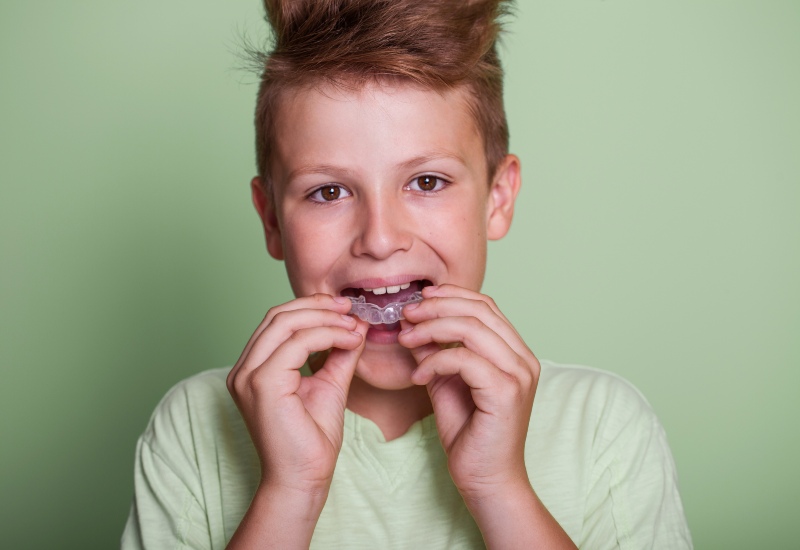How Mouthguards Keep Your Teeth Safe During Sports and Activities
Dental Care of Westlake in Westlake, OH is committed to high-quality dental services because we know a healthy smile is one of your greatest assets, and protecting it should be a top priority. While much of this comes with brushing and flossing at home and bi-annual cleanings, it also includes being careful during sports and recreational activities. Whether you’re a student-athlete, a weekend warrior, or a parent of an active child, safeguarding teeth from injury is essential. Here’s how mouthguards can protect your teeth, gums, and mouth during various activities.
Why Protecting Your Teeth During Sports Matters
Every year, thousands of dental injuries occur during sports and physical activities. From chipped and broken teeth to jaw injuries and even tooth loss, the risks are real. Contact sports like football, hockey, and basketball are obvious culprits, but even non-contact activities like skateboarding, gymnastics, or mountain biking can lead to unexpected accidents.
The American Dental Association estimates that athletes are more than twice as likely to suffer harm to their teeth when not wearing a mouthguard. That’s a staggering statistic that underscores the importance of taking preventive measures seriously.

The Importance of Mouthguards
Teeth protection gear acts as a cushion between your mouth and the forces of impact. It helps absorb and distribute the energy from a blow to the face, reducing the risk of:
- Injuries to the lips, tongue, and cheeks
- Broken or chipped teeth
- Tooth loss
- Jaw fractures
By wearing a properly fitted mouthguard, athletes can significantly reduce the severity of oral injuries, emergency dental treatments, and long-term complications.
Types of Mouthguards
There are three main types of mouthguards available, each with its own pros and cons:
1. Stock Mouthguards
These are pre-formed and ready to wear right out of the package. While they’re inexpensive and easy to find at sporting goods stores, they often fit poorly and can be bulky, making it difficult to breathe or speak clearly.
2. Boil-and-Bite Mouthguards
Made from thermoplastic material, these mouthguards are softened in hot water and then molded to the shape of your teeth. They offer a better fit than stock versions and are also widely available. However, they may still lack the comfort and protection of a custom-made option.
3. Custom-Fitted Mouthguards
Custom mouthguards are created by a dentist using an impression of your teeth. They offer the best fit, comfort, and protection and are especially recommended for athletes with braces or those participating in high-impact sports. They are more expensive, but the investment is well worth it for the level of protection they provide.
Benefits of Using a Mouthguard
Wearing a mouthguard offers several benefits beyond protecting your teeth, including:
- Preventing Soft Tissue Injuries – Shields your lips, cheeks, and tongue from cuts and bruises.
- Reducing the Risk of Jaw Injuries – Helps stabilize the jaw and absorb shock.
- Possibly Reducing Concussion Risk – Some studies suggest that mouthguards can help reduce the severity of concussions by cushioning blows to the jaw.
- Improving Confidence – Knowing you’re protected allows you to play more confidently and focus on performance.
How to Choose the Right Mouthguard
When selecting a mouthguard, consider the following factors:
- Fit and Comfort – A good mouthguard should fit snugly without restricting breathing or speech.
- Durability – Look for a mouthguard that can withstand repeated use without tearing or deforming.
- Sport-Specific Needs – Some sports may require additional protection or specific designs.
- Dental Conditions – A custom mouthguard is essential to ensure proper fit and protection if you wear braces or have dental appliances.
Consulting with a dentist can help you determine the best option based on age, activity level, and dental health. It’s also a good opportunity to learn more about custom mouthguard benefits.
Caring for Your Mouthguard
To keep your mouthguard in good shape and free from bacteria:
- Rinse it with cool water or mouthwash before and after each use
- Clean it regularly with a toothbrush and mild soap
- Store it in a ventilated container to allow it to dry
- Keep it away from heat, which can cause warping
Check for signs of wear and replace it as needed. Depending on which style you have, it might need to be replaced every season, unless it’s damaged, in which case it should be replaced sooner.
Common Myths About Mouthguards
It’s easy to rationalize not investing in a protective mouthguard. These are the most common reasons and why you should reconsider:
“I don’t need one for non-contact sports.”
Accidents can happen in any sport. Even a fall or collision in a non-contact activity can cause serious dental injuries.
“They’re uncomfortable and hard to breathe in.”
While this may be true for stock mouthguards, custom-fitted ones are designed for comfort and easy breathing.
“Only kids need mouthguards.”
Adults are just as susceptible to dental injuries. Mouthguards are important for athletes of all ages.
“They’re too expensive.”
Compared to the cost of emergency dental treatment, a mouthguard is a small investment to prevent dental injuries.
Protect Your Smile With Dental Care of Westlake
We’re passionate about helping our patients protect their smiles—on and off the field. If you or your child wants to learn about mouthguards for sports and other activities, schedule a consultation at Dental Care of Westlake in Westlake, OH to discuss custom mouthguard options. Our experienced team is here to guide you through the process and ensure you get the best protection possible. Don’t wait until an injury happens—take a proactive step toward dental safety today.
